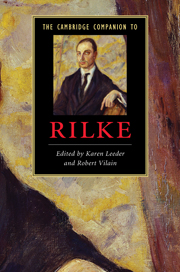5 - The Notebooks of Malte Laurids Brigge
from PART II - WORKS
Published online by Cambridge University Press: 28 July 2010
Summary
The Notebooks of Malte Laurids Brigge occupies a singular position in the history of modernist prose. Rilke's only 'novel', written in the Paris years during a pivotal crisis of the poet's creative imagination and finished with some difficulty far from Paris, is fundamentally concerned with issues of poetic language, vision and imagination. It tells the story of Malte, a twenty-eight-year-old aristocratic Dane whose artistic aspirations bring him to Paris, where he begins to record his life crisis, experiences and memories in a series of diary-like notations. However, Rilke soon abandons the fictional convention of telling the story of an individual bound by a defined space and by chronological time. Especially in the second part, fictional plot gives way to a series of literary and historical reflections that push the work toward allegory and essayism rather than providing narrative and plot. Read in light of this second part, even the first, more directly narrative section of the text, which is focused on Malte's traumatic reactions to city life, appears less like a novel and more like a concatenation of narrative fragments and miniatures not primarily controlled by a storyline, but by a consciousness and subjectivity in crisis.
Thus it makes sense that Rilke should draw on the convention of the diary form. But here, too, the suggestion of a sequential diary is abandoned as soon as it is introduced. There is only one conventional diary heading, the one on the first page: ‘September 11, rue Toullier’. After that, the reader’s expectation of a stable progression in time and space is again undermined. The informed reader soon begins to wonder to what extent the figure of Malte serves as a screen for the writer himself – Rilke in Paris, his own life crisis as a poet, his sense of alienation and estranged perception, of ego loss or ego dispersal – all displaced and rewritten as the life crisis of an other, a fictional figure.
- Type
- Chapter
- Information
- The Cambridge Companion to Rilke , pp. 74 - 79Publisher: Cambridge University PressPrint publication year: 2010
- 1
- Cited by



